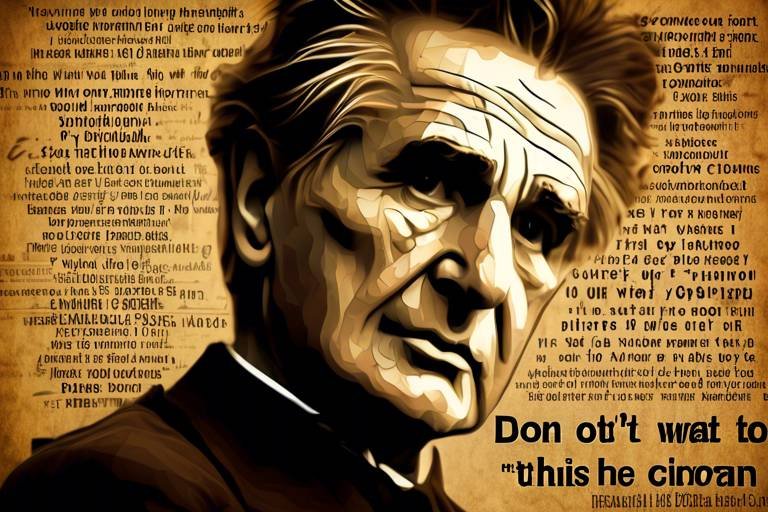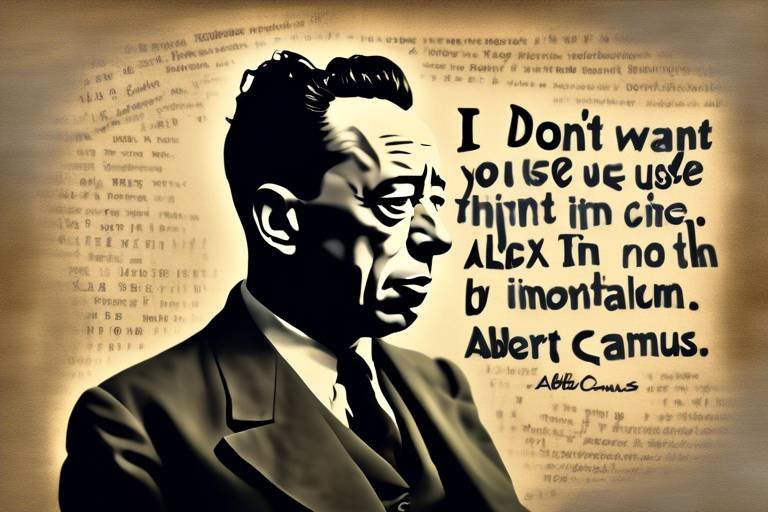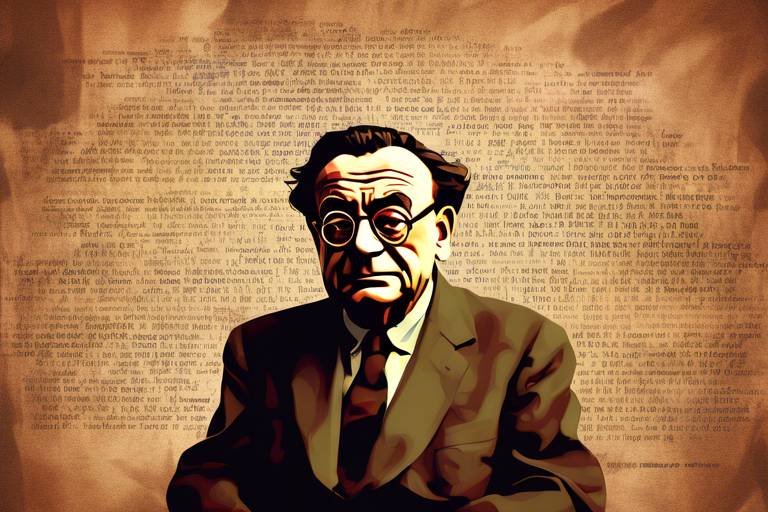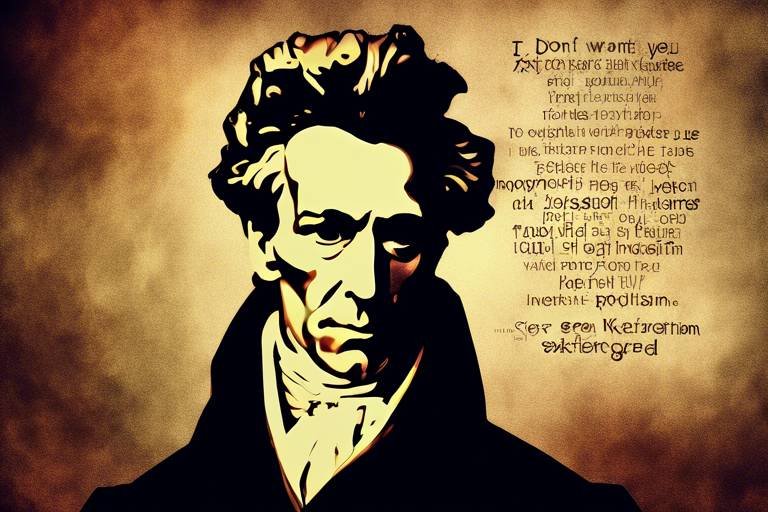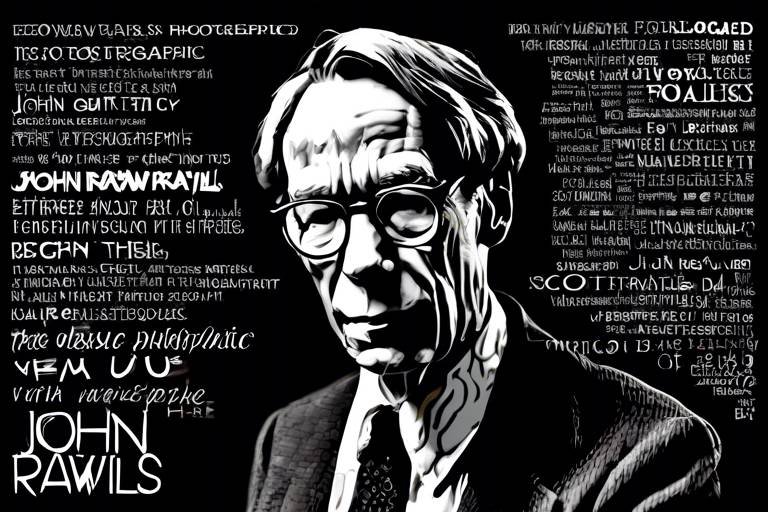Concepts of Freedom and Liberty in John Stuart Mill's Philosophy
In the realm of philosophy, few thinkers have had as profound an impact on the concepts of freedom and liberty as John Stuart Mill. His ideas resonate not only in the 19th century but continue to echo in contemporary discussions about individual rights and societal norms. Mill's exploration of these concepts invites us to ponder the delicate balance between personal autonomy and the collective good. But what exactly do freedom and liberty mean in Mill's philosophy? And how do they interconnect to shape our understanding of individual rights? Let’s dive into the intricate tapestry of Mill's thought, where freedom is not just a privilege but a fundamental human necessity.
Mill's philosophy is deeply rooted in the historical context of his time, a period marked by rapid social change and the emergence of liberal thought. The Industrial Revolution was transforming societies, leading to new ideas about governance, personal rights, and the role of the individual. In this environment, Mill championed the cause of individual liberty, arguing that true freedom is essential for both personal development and societal progress. He believed that when individuals are free to express themselves and pursue their own paths, society as a whole benefits from increased creativity and innovation.
Defining freedom and liberty is where Mill's insights become particularly illuminating. He draws a clear distinction between the two, suggesting that while freedom often refers to the absence of constraints, liberty encompasses the ability to act according to one’s own will, provided it does not harm others. This nuanced understanding is crucial, as it emphasizes the interconnectedness of individual rights and the responsibility that comes with them. Mill’s philosophy invites us to consider: how do we navigate our freedoms without infringing upon the rights of others? This question lies at the heart of his ethical framework.
To fully appreciate Mill's contributions, we must consider the historical backdrop against which he wrote. The 19th century was a time of great upheaval, characterized by the decline of traditional authority and the rise of individualism. Mill was influenced by earlier Enlightenment thinkers, such as John Locke and Jeremy Bentham, yet he sought to expand their ideas, particularly in relation to personal liberties. The political landscape was shifting, with movements advocating for civil rights and democratic governance gaining momentum. Mill's writings emerged as a response to these changes, articulating a vision of society where individual liberty is protected, and personal autonomy is celebrated.
In Mill's view, freedom is often seen as the absence of external constraints, while liberty encompasses a broader spectrum of rights and responsibilities. He emphasizes that true liberty is not merely the ability to do as one pleases; it also involves the recognition of the rights of others. This perspective leads us to his famous Harm Principle, which posits that the only justification for limiting an individual's freedom is to prevent harm to others. This principle serves as a guiding light in Mill's philosophy, shaping our understanding of the limits of personal autonomy.
Mill's Harm Principle is a pivotal element of his thought. It asserts that individuals should be free to act however they wish unless their actions cause harm to someone else. This principle is revolutionary because it challenges the idea that societal norms or government authority can impose restrictions on personal behavior without just cause. For Mill, the protection of individual freedoms is paramount, and any infringement upon those freedoms must be carefully justified. This raises important questions about the role of authority and the limits of governance in our lives.
The implications of the Harm Principle are profound. It underscores the importance of personal autonomy, suggesting that individuals should have the freedom to make choices about their own lives, provided those choices do not infringe on the rights of others. This idea is particularly relevant in contemporary discussions about issues such as personal privacy, freedom of speech, and the right to choose. Mill's advocacy for personal autonomy encourages us to reflect on our own lives: are we truly free to make our own choices, or are we constrained by societal expectations and norms?
Mill's views challenge the authority of government and societal norms, advocating for minimal interference in personal liberties unless necessary to prevent harm. He argues that the majority should not impose its will on the minority, a concept that remains relevant in today's pluralistic societies. This challenge to authority is a call to action, urging us to question the legitimacy of restrictions placed upon our freedoms. Are these restrictions genuinely for our benefit, or do they serve to uphold the status quo?
Mill's utilitarian framework integrates the concept of individual rights, arguing that the greatest happiness principle must consider the freedoms of individuals in society. He believed that individual liberty is not only a personal right but also a societal necessity. By allowing individuals to pursue their own happiness, society as a whole can flourish. This perspective encourages us to think critically about how our actions affect others and to strive for a balance that maximizes happiness for all.
Mill firmly believed that individual liberty is essential for social progress. When people are free to express themselves and explore new ideas, society benefits from the resulting creativity and innovation. This concept is akin to a vibrant marketplace where diverse thoughts and perspectives can be exchanged, leading to greater understanding and advancement. Mill’s vision of liberty as a catalyst for progress challenges us to advocate for environments that foster open dialogue and the free exchange of ideas.
In Mill's philosophy, the marketplace of ideas is a vital concept. He posits that freedom of expression is crucial for intellectual and societal advancement. Just as a marketplace thrives on competition and diversity, so too does a society flourish when its members can freely share and debate their ideas. This notion emphasizes the importance of protecting free speech and encourages us to engage with diverse viewpoints, even those we may disagree with. After all, it is through these exchanges that we grow and evolve.
Despite the importance of liberty, Mill acknowledges various challenges that threaten it. He addresses the tyranny of the majority and societal pressures that can stifle individual freedoms. Mill advocates for safeguards to protect individual rights against collective oppression, reminding us that the fight for liberty is ongoing. In our modern world, we must remain vigilant against forces that seek to undermine our freedoms, whether they come from government overreach or societal expectations.
The principles of freedom and liberty articulated by Mill remain highly relevant today. They influence contemporary debates on human rights, governance, and the balance between individual freedoms and societal norms. As we navigate an increasingly complex world, Mill's insights serve as a guiding light, encouraging us to champion personal autonomy while respecting the rights of others. In a society that often grapples with issues of inequality and oppression, Mill's philosophy reminds us of the enduring power of freedom and the importance of safeguarding it for future generations.
- What is the difference between freedom and liberty in Mill's philosophy?
Freedom generally refers to the absence of constraints, while liberty encompasses the ability to act according to one’s own will, respecting the rights of others.
- What is the Harm Principle?
The Harm Principle states that individual freedom should only be restricted to prevent harm to others, emphasizing personal autonomy.
- How does Mill's philosophy address the challenges to individual liberty?
Mill acknowledges challenges such as the tyranny of the majority and advocates for safeguards to protect individual rights against collective oppression.

Historical Context of Mill's Philosophy
To truly appreciate John Stuart Mill's concepts of freedom and liberty, one must consider the rich historical tapestry of the 19th century, a time of significant upheaval and transformation. Mill was born in 1806, a period marked by the aftermath of the Enlightenment, the Industrial Revolution, and the rise of liberal thought. These elements intertwined to create an environment ripe for philosophical exploration. The Enlightenment had introduced ideas of reason, individualism, and skepticism of authority, while the Industrial Revolution was reshaping societies, economies, and the very fabric of daily life.
During Mill's lifetime, Europe was grappling with the consequences of these changes. The French Revolution had sparked debates about democracy, rights, and the role of the individual in society. Mill was influenced by the writings of philosophers such as Jeremy Bentham, who championed utilitarianism, and Immanuel Kant, whose ideas on autonomy and moral philosophy resonated deeply with Mill's own thoughts on individual rights. The tension between tradition and progress was palpable, and Mill positioned himself as a bridge between these two worlds, advocating for a more progressive approach to governance and society.
Moreover, the political landscape of the time was characterized by various movements advocating for social reform. Issues such as women's suffrage, labor rights, and the abolition of slavery were gaining traction, and Mill was an ardent supporter of many of these causes. His writings reflect a commitment to expanding individual liberties and ensuring that the rights of marginalized groups were recognized and protected. This progressive stance placed him at odds with many contemporary thinkers who were more conservative in their views.
In this context, Mill's philosophy emerges not just as a theoretical framework but as a response to the pressing social issues of his time. He grappled with the implications of freedom and liberty in a rapidly changing world, emphasizing the need for a balance between individual rights and the common good. His work laid the groundwork for future discussions about personal autonomy and the role of government, making his ideas not only relevant in his time but also in contemporary discourse.
As we delve deeper into Mill's philosophy, it becomes clear that understanding this historical backdrop is essential. It provides insight into why Mill placed such a strong emphasis on liberty and how his ideas continue to resonate today. The struggle for individual rights, the fight against tyranny, and the pursuit of social progress remain as vital now as they were in Mill's era. In essence, Mill's thoughts on freedom and liberty are not merely abstract concepts; they are grounded in the realities of his time, reflecting the complexities of human experience and societal evolution.
- What was John Stuart Mill's main contribution to philosophy? Mill's primary contribution lies in his advocacy for individual liberty and the Harm Principle, which asserts that individuals should be free to act as they wish unless their actions harm others.
- How did the Industrial Revolution influence Mill's ideas? The Industrial Revolution brought about significant social changes, prompting Mill to emphasize the importance of personal freedoms and the need for societal reform to protect individual rights.
- What is the Harm Principle? The Harm Principle is a key aspect of Mill's philosophy that states individuals should be free to do anything except that which harms others, establishing a boundary for personal liberty.
- Why are Mill's ideas still relevant today? Mill's concepts of freedom and liberty continue to influence contemporary debates on human rights, governance, and the balance between individual freedoms and societal norms.

Defining Freedom and Liberty
When we dive into the philosophical waters of John Stuart Mill, we quickly find ourselves navigating the intricate definitions of freedom and liberty. At first glance, these terms might seem interchangeable, but Mill's nuanced approach reveals a rich tapestry of meaning that is vital for understanding his overall philosophy. To Mill, freedom is often seen as the absence of constraints, the ability to act according to one’s own will without interference. Liberty, however, encompasses a broader spectrum, including the idea of rights and the moral implications of exercising that freedom.
Mill distinguishes between two types of liberty: positive liberty and negative liberty. Positive liberty refers to the idea of being one's own master, having the power and resources to fulfill one’s own potential. In contrast, negative liberty is about the absence of external constraints, the freedom from interference by others, especially by the state. This distinction is crucial because it underscores that while we may have the freedom to act, we must also consider whether we have the liberty to pursue our own happiness in a meaningful way.
In his view, the relationship between freedom and liberty is deeply intertwined with the concept of individual rights. Mill argues that it is not enough to simply be free; individuals must also have the right to make choices that reflect their own values and beliefs. This means that society must respect and protect these rights, allowing individuals to express themselves without fear of oppression. In this light, Mill’s philosophy champions the idea that the true essence of liberty is found in the ability to pursue one’s own path while respecting the rights of others.
To further illustrate this relationship, consider the following table that summarizes the key differences between freedom and liberty:
| Aspect | Freedom | Liberty |
|---|---|---|
| Definition | Absence of constraints | Rights and moral implications |
| Type | Negative liberty | Positive liberty |
| Focus | Individual actions | Individual rights |
| Implications | Freedom from interference | Empowerment to pursue happiness |
Ultimately, Mill’s exploration of freedom and liberty invites us to reflect on our own lives. Are we merely free from constraints, or do we actively engage in the pursuit of our happiness and potential? This question is not just philosophical; it has practical implications for how we structure our societies and govern ourselves. In a world where the balance between individual rights and collective good is constantly in flux, understanding Mill’s definitions of freedom and liberty can help guide our discussions and decisions.
- What is the difference between freedom and liberty? Freedom typically refers to the absence of constraints, while liberty encompasses rights and the moral implications of exercising that freedom.
- How does Mill's philosophy apply to modern society? Mill's ideas encourage us to consider individual rights in the context of societal norms, advocating for minimal interference unless harm is involved.
- What is the Harm Principle? The Harm Principle asserts that individual freedom should only be limited to prevent harm to others, a key tenet of Mill's philosophy.

The Harm Principle
One of the most significant contributions of John Stuart Mill to political philosophy is his concept known as the Harm Principle. This principle is a cornerstone of Mill's argument for individual freedom and autonomy. At its core, the Harm Principle asserts that individuals are free to act as they wish, provided their actions do not harm others. This idea is not only revolutionary but also a guiding light for understanding the limits of personal liberty in a society.
Imagine a world where everyone is free to express themselves without fear of retribution or censorship. Mill believed that this kind of freedom is essential for a thriving society, but he also recognized that absolute freedom could lead to chaos. Thus, he proposed that the only legitimate reason for society or the government to intervene in an individual's life is to prevent harm to others. This creates a delicate balance between individual rights and the well-being of the community.
The implications of the Harm Principle are profound. It suggests that personal autonomy is paramount; individuals should have the right to make choices about their lives, as long as these choices do not infringe on the rights of others. For instance, consider the following scenarios:
- A person chooses to pursue a career in the arts, which may not be economically stable but fulfills their personal aspirations.
- Someone decides to express their political beliefs publicly, even if those beliefs are unpopular.
- A group of friends engages in a private gathering that some may find objectionable, yet it does not harm anyone outside their circle.
In each of these examples, the individuals are exercising their freedoms in ways that do not cause harm to others. Mill's philosophy encourages this kind of personal expression, arguing that it is essential for both individual growth and societal progress. However, the challenge lies in defining what constitutes "harm." Mill acknowledges that this can be subjective, which is why he emphasizes the importance of a democratic society where such discussions can take place openly.
Moreover, Mill's views challenge the authority of government and societal norms. He advocates for minimal interference in personal liberties unless absolutely necessary to prevent harm. This idea can be seen as a direct challenge to the tyranny of the majority, where the will of the majority can suppress individual rights. Mill argues that just because a majority holds a belief does not mean it is inherently right or just. Instead, he calls for a system where minority opinions are valued and protected.
In conclusion, the Harm Principle is not just a theoretical concept; it serves as a practical guideline for navigating the complexities of freedom and authority in society. It invites us to ponder: How do we balance individual liberty with the need for societal order? Mill's insights remain relevant today, encouraging ongoing dialogue about the nature of freedom and the responsibilities that come with it.
- What is the Harm Principle?
The Harm Principle is the idea that individuals are free to act as they wish unless their actions harm others. - How does the Harm Principle relate to personal autonomy?
It emphasizes that individuals should have the freedom to make choices about their lives without interference, as long as they do not infringe on others' rights. - Why is the Harm Principle important in modern society?
It provides a framework for discussing the limits of freedom, particularly in contexts like free speech and personal conduct.

Implications for Personal Autonomy
John Stuart Mill’s philosophy places a significant emphasis on personal autonomy, suggesting that individuals should be free to make their own choices without interference, provided those choices do not harm others. This idea is not just a theoretical concept; it has profound implications for how we view human rights and individual freedoms in our everyday lives. Imagine living in a world where your choices are dictated by others—how stifling and limiting that would be! Mill argues that personal autonomy is essential for the development of a vibrant society, where creativity and innovation can flourish.
Mill's perspective on personal autonomy challenges us to think critically about the role of authority in our lives. He contends that while society has a vested interest in the well-being of its members, it should not impose restrictions on individual freedoms unless absolutely necessary. This principle aligns closely with the idea that individuals are the best judges of their own interests. For instance, consider the implications of this philosophy in the realm of healthcare decisions. Should a government dictate what medical treatments a person can pursue, or should individuals have the autonomy to make choices regarding their own health?
Moreover, Mill’s thoughts on personal autonomy extend into the realm of social norms and expectations. Often, societal pressures can lead individuals to conform to certain behaviors or beliefs, even if they conflict with personal values. Mill would argue that such conformity can be detrimental, as it suppresses individuality and creativity. By championing personal autonomy, he encourages a society where diverse perspectives and lifestyles are not just tolerated but celebrated. This is akin to a garden where each flower, unique in its color and shape, contributes to the beauty of the whole.
To further illustrate the implications of personal autonomy in Mill's philosophy, we can break it down into several key areas:
- Empowerment: Individuals are empowered to make choices that reflect their values and desires.
- Responsibility: With autonomy comes the responsibility for one's choices, fostering a sense of accountability.
- Innovation: A society that respects personal autonomy is likely to see greater levels of creativity and innovation.
- Social Cohesion: Understanding and respecting individual choices can lead to a more harmonious society, where differences are embraced rather than shunned.
In essence, the implications for personal autonomy in Mill's philosophy serve as a powerful reminder of the importance of individual rights in a democratic society. It compels us to reflect on how we can create an environment where everyone has the freedom to pursue their own path, contributing to the collective good without compromising their individuality. As we navigate through modern challenges, Mill’s insights remind us that safeguarding personal autonomy is crucial for the progress of society as a whole.
1. What is personal autonomy according to John Stuart Mill?
Personal autonomy, in Mill's philosophy, refers to the right of individuals to make their own choices and decisions without interference from others, as long as those choices do not harm others.
2. How does Mill's Harm Principle relate to personal autonomy?
Mill's Harm Principle asserts that individual freedom should only be limited to prevent harm to others, thus reinforcing the importance of personal autonomy in making choices.
3. Why is personal autonomy important for social progress?
Personal autonomy fosters creativity and innovation, allowing individuals to express their unique perspectives, which ultimately contributes to the advancement of society as a whole.
4. What are the challenges to personal autonomy?
Challenges to personal autonomy include societal pressures, government regulations, and the tyranny of the majority, which can all infringe upon an individual's right to make personal choices.

Limitations of Authority
John Stuart Mill's philosophy brings to light the critical idea that authority, whether it stems from government, societal norms, or cultural expectations, should be scrutinized and limited. Mill argues that the power of authority must be kept in check to protect the individual freedoms that are essential for a flourishing society. This perspective is not merely theoretical; it serves as a call to action for individuals and institutions alike to question the legitimacy and necessity of any imposed restrictions on personal liberties.
One of the central tenets of Mill's argument is that authority should only intervene in an individual's life when it is necessary to prevent harm to others. This principle is not only a guideline for governance but also a moral compass for society. Mill believed that individuals should have the freedom to explore their own paths, experiment with their choices, and even make mistakes, as long as their actions do not infringe upon the rights of others. This notion of limited authority can be contrasted with more authoritarian approaches that seek to control personal conduct without just cause.
To illustrate Mill's perspective, consider the following scenarios where authority might overreach:
- Personal Choices: When authority dictates how individuals should live their lives, such as in matters of sexuality, lifestyle, or personal beliefs, it encroaches on personal autonomy.
- Expression of Ideas: Censorship of speech or thought, even if deemed unpopular or offensive, undermines the marketplace of ideas that Mill champions.
- Social Norms: Societal pressures that compel conformity can stifle individuality and creativity, leading to a homogenized culture.
Mill's advocacy for limited authority is a powerful reminder that the balance between liberty and control is delicate. He posits that when authority exceeds its rightful bounds, it not only harms individuals but also stifles societal progress. The limitations of authority are essential for fostering an environment where creativity and innovation can thrive. In this sense, Mill's philosophy resonates with the idea that true progress can only occur when individuals are free to express themselves and pursue their own happiness without undue interference.
In conclusion, Mill's insights into the limitations of authority serve as a foundational element in the ongoing discourse about personal freedoms. They encourage us to critically evaluate the role of authority in our lives and to advocate for a society that prioritizes individual rights while maintaining a necessary framework for collective well-being. By challenging the legitimacy of authority and its reach, we not only honor Mill's legacy but also pave the way for a more liberated future.
- What is the Harm Principle? The Harm Principle is a concept proposed by Mill that states individuals should be free to act however they wish unless their actions cause harm to others.
- How does Mill view authority? Mill believes that authority should be limited and only exercised to prevent harm to others, advocating for personal autonomy.
- Why is individual liberty important according to Mill? Individual liberty is crucial for social progress, creativity, and the pursuit of truth, ultimately benefiting society as a whole.

Utilitarianism and Individual Rights
John Stuart Mill's philosophy intertwines the concepts of utilitarianism and individual rights in a way that challenges conventional thinking about happiness and morality. At its core, utilitarianism posits that the best action is the one that maximizes overall happiness or utility. However, Mill's interpretation goes beyond mere numbers; he emphasizes the quality of pleasures and the significance of individual rights in achieving true happiness.
Mill argues that individual rights are not just abstract principles but essential components of a happy society. He believes that for utilitarianism to be genuinely effective, it must consider the rights and freedoms of individuals. In this light, Mill introduces the idea that the greatest happiness principle should not only focus on the majority's well-being but also protect minority rights. This is crucial because, without safeguarding individual freedoms, the pursuit of happiness can easily devolve into tyranny by the majority.
To better illustrate this relationship, consider the following table that outlines the key elements of Mill's thought on utilitarianism and individual rights:
| Aspect | Utilitarianism | Individual Rights |
|---|---|---|
| Definition | Maximizing overall happiness | Protecting personal freedoms |
| Focus | Consequences of actions | Rights of the individual |
| Majority vs. Minority | Majority happiness prioritized | Safeguards against majority oppression |
| Outcome | Collective well-being | Personal autonomy and dignity |
In essence, Mill's philosophy asserts that individual rights should not be sacrificed for the sake of the majority's happiness. Instead, he argues for a balance where individual freedoms contribute to the greater good. This approach is revolutionary because it lays the groundwork for modern human rights discussions, emphasizing that every person deserves respect and autonomy.
Moreover, Mill's thoughts on utilitarianism and individual rights prompt us to reflect on current societal issues. For instance, discussions surrounding free speech, privacy, and personal choice resonate with Mill's ideas. In today's world, where the balance between collective security and individual freedoms often comes into question, Mill's insights remain profoundly relevant.
In conclusion, Mill's integration of utilitarianism with individual rights forms a critical framework for understanding the complexities of morality and happiness. By advocating for the protection of individual freedoms while pursuing the greater good, he challenges us to consider how we can create a society that values both personal autonomy and collective well-being.
- What is the Harm Principle? The Harm Principle is a key concept in Mill's philosophy, stating that individual freedom should only be limited to prevent harm to others.
- How does Mill define happiness? Mill distinguishes between higher and lower pleasures, arguing that intellectual and moral pleasures hold more value than mere physical gratification.
- Why are individual rights important in utilitarianism? Individual rights ensure that the pursuit of happiness does not infringe on personal freedoms, preventing the tyranny of the majority.
- How can Mill's ideas be applied today? Mill's thoughts on freedom and rights can guide contemporary discussions on issues like free speech, privacy, and government authority.

Liberty and Social Progress
John Stuart Mill was not just a philosopher; he was a visionary who understood that individual liberty is the lifeblood of social progress. Imagine a garden where each flower represents a unique idea or talent. Without the freedom to grow, some flowers may never bloom, and the garden would lack its vibrant diversity. Mill argued that when individuals are free to express themselves, to innovate, and to pursue their own paths, society as a whole benefits immensely. This belief is rooted in the idea that creativity and innovation thrive in an environment where personal freedoms are respected.
Mill's perspective on liberty is intertwined with his understanding of social progress. He believed that the advancement of society hinges on the collective contributions of its members, each bringing their unique perspectives and talents to the table. Just think about it: when people are allowed to think freely and share their ideas, we see a flourishing of knowledge and culture. This exchange of ideas is what Mill referred to as the marketplace of ideas, where the most robust concepts survive and prosper, leading to the betterment of society.
Moreover, Mill emphasized that liberty is not just a personal privilege; it is a societal necessity. When individuals are encouraged to think independently, they challenge the status quo and question outdated norms. This critical examination is vital for progress. For instance, movements advocating for civil rights, gender equality, and environmental sustainability all stem from individuals exercising their liberties to challenge established norms. These movements not only transform society but also inspire future generations to continue the pursuit of justice and equality.
However, Mill was also aware of the potential pitfalls that come with freedom. He warned against the tyranny of the majority, where the majority's opinions could suppress minority voices. In his view, true liberty requires safeguards that protect individual rights, ensuring that everyone has a platform to express their ideas without fear of retribution. This is essential for fostering a culture of innovation and progress, where diverse thoughts can coexist and contribute to the common good.
| Key Aspects of Liberty and Social Progress | Description |
|---|---|
| Individual Expression | Freedom allows individuals to express their thoughts and ideas, leading to a richer cultural landscape. |
| Innovation | Liberty fosters an environment where creativity can thrive, resulting in technological and social advancements. |
| Critical Examination | Freedom encourages questioning of societal norms, which is essential for progress. |
| Protection of Minority Rights | Safeguards must be in place to protect individual rights against the majority's will. |
In conclusion, Mill's philosophy serves as a powerful reminder of the intrinsic link between liberty and social progress. It is through the celebration of individual freedoms that societies can truly flourish, paving the way for a brighter future. By embracing diversity of thought and protecting the rights of all individuals, we create a fertile ground for innovation, creativity, and ultimately, a more just society.
- What is the significance of liberty in Mill's philosophy?
Liberty is central to Mill's philosophy as it fosters individual expression and social progress, allowing society to benefit from diverse ideas and innovations.
- How does Mill's concept of liberty relate to modern society?
Mill's ideas about liberty remain relevant today, influencing contemporary discussions on human rights, governance, and the balance between individual freedoms and collective norms.
- What safeguards does Mill suggest to protect individual rights?
Mill advocates for legal protections and societal norms that prevent the majority from oppressing minority opinions, ensuring that all voices are heard and respected.

Marketplace of Ideas
In the rich tapestry of John Stuart Mill's philosophy, the concept of the stands out as a beacon of intellectual freedom. Mill believed that just as a free market allows goods and services to compete, a free exchange of ideas enables the best thoughts to rise to the surface. Imagine a bustling marketplace where diverse opinions clash and collaborate; this is the essence of Mill's vision. In such a dynamic environment, ideas are tested against one another, allowing the strongest and most beneficial concepts to flourish while weaker ones naturally fade away.
Mill argued that this intellectual competition is not merely beneficial but essential for societal progress. When individuals are allowed to express their opinions freely, society as a whole benefits from the diversity of thought. This diversity fosters creativity and innovation, leading to advancements in various fields such as science, art, and politics. Without the freedom to express dissenting opinions, society risks stagnation, trapped in a cycle of unchallenged beliefs. Mill's metaphor of the marketplace serves as a reminder that just as consumers benefit from a variety of products, citizens benefit from a variety of ideas.
Moreover, Mill emphasized the importance of freedom of expression as a fundamental human right. He believed that every individual should have the right to voice their thoughts, no matter how controversial or unpopular they may be. This principle is crucial in preventing the tyranny of the majority, where dominant ideologies suppress minority voices. In Mill's view, the suppression of any idea, regardless of its popularity, limits the overall growth of society. Therefore, he advocated for an open dialogue where all ideas, even those that challenge the status quo, can be discussed freely.
However, Mill was not naïve about the challenges that come with this marketplace. He recognized that not all ideas are created equal; some can be harmful or misleading. Thus, he proposed a framework where ideas could be critiqued and debated, allowing the public to discern the value of different perspectives. This process is akin to a rigorous vetting system where only the most robust ideas survive the scrutiny of public discourse.
In today's digital age, the concept of the Marketplace of Ideas is more relevant than ever. With the rise of social media and online platforms, we see a global exchange of ideas that can either empower or overwhelm individuals. It is essential to navigate this landscape with discernment, ensuring that the principles Mill championed are upheld. By fostering an environment where diverse voices can be heard, we not only honor Mill's legacy but also pave the way for a more enlightened society.
- What is the Marketplace of Ideas?
The Marketplace of Ideas is a metaphor used by John Stuart Mill to describe the free exchange of thoughts and opinions, similar to a free market where ideas compete for acceptance. - Why is freedom of expression important?
Freedom of expression is crucial because it allows for a diversity of ideas, which fosters innovation, creativity, and societal progress. - How does Mill address harmful ideas?
Mill acknowledges that while all ideas should be expressed, they must also be subjected to critique and debate to discern their validity and impact on society.

marketplace of ideas
Understanding the historical backdrop of Mill's life and the philosophical movements of his time is crucial to grasping his concepts of freedom and liberty.
Mill distinguishes between freedom and liberty, emphasizing their nuanced meanings within his philosophical discourse, and how these concepts interrelate in the context of individual rights.
One of Mill's key contributions is the Harm Principle, which asserts that individual freedom should only be limited to prevent harm to others, shaping modern discussions on personal liberty.
The Harm Principle underscores the importance of personal autonomy, suggesting that individuals should be free to make choices as long as they do not infringe on the rights of others.
Mill's views challenge the authority of government and societal norms, advocating for minimal interference in personal liberties unless necessary to prevent harm.
Mill's utilitarian framework integrates the concept of individual rights, arguing that the greatest happiness principle must consider the freedoms of individuals in society.
Mill believed that individual liberty is essential for social progress, as it fosters creativity, innovation, and the pursuit of truth, which ultimately benefits society as a whole.
In Mill's philosophy, the promotes the exchange of diverse thoughts, reinforcing the notion that freedom of expression is vital for intellectual and societal advancement. Just like a bustling market where various goods are exchanged, ideas thrive when they are freely shared and debated. Mill argued that the best ideas emerge from this competition; they are tested against one another, allowing the most robust and beneficial concepts to shine through. This dynamic process not only enhances individual understanding but also contributes to the collective wisdom of society.
Moreover, Mill contended that silencing any opinion, no matter how unpopular, is detrimental to the growth of knowledge. It stifles the potential for discovering truth and inhibits social progress. Just imagine if all the thinkers of the past were muted; we would lack many of the revolutionary ideas that have shaped our world today. Thus, the marketplace of ideas serves as a protective barrier against tyranny, ensuring that every voice has the opportunity to be heard.
Importantly, Mill's concept also emphasizes the need for critical thinking and open dialogue. Individuals must engage with opposing viewpoints, not simply to dismiss them but to understand and refine their own beliefs. This engagement fosters a culture of respect and tolerance, allowing society to evolve in a more enlightened direction. In essence, the marketplace of ideas is not just about freedom of speech; it’s about the cultivation of a vibrant intellectual community where ideas can flourish.
Mill addresses various challenges to liberty, including tyranny of the majority and societal pressures, advocating for safeguards to protect individual freedoms against collective oppression.
The principles of freedom and liberty articulated by Mill remain highly relevant today, influencing contemporary debates on human rights, governance, and the balance between individual freedoms and societal norms.
- What is the Harm Principle?
The Harm Principle is Mill's assertion that individual freedom should only be limited to prevent harm to others, promoting personal autonomy and minimal interference by authorities. - How does Mill define freedom and liberty?
Mill distinguishes between freedom as the absence of interference and liberty as the ability to pursue one's own good, emphasizing their interconnectedness in relation to individual rights. - What is the significance of the marketplace of ideas?
The marketplace of ideas is crucial for fostering intellectual exchange, allowing diverse thoughts to compete, which leads to the discovery of truth and societal progress. - How are Mill's ideas relevant today?
Mill's concepts of freedom and liberty continue to influence modern discussions on human rights, governance, and the balance between individual freedoms and societal norms.

promotes the exchange of diverse thoughts, reinforcing the notion that freedom of expression is vital for intellectual and societal advancement.
This article explores the intricate ideas of freedom and liberty as articulated by John Stuart Mill, highlighting their significance in his philosophical framework and their impact on contemporary thought.
Understanding the historical backdrop of Mill's life and the philosophical movements of his time is crucial to grasping his concepts of freedom and liberty.
Mill distinguishes between freedom and liberty, emphasizing their nuanced meanings within his philosophical discourse, and how these concepts interrelate in the context of individual rights.
One of Mill's key contributions is the Harm Principle, which asserts that individual freedom should only be limited to prevent harm to others, shaping modern discussions on personal liberty.
The Harm Principle underscores the importance of personal autonomy, suggesting that individuals should be free to make choices as long as they do not infringe on the rights of others.
Mill's views challenge the authority of government and societal norms, advocating for minimal interference in personal liberties unless necessary to prevent harm.
Mill's utilitarian framework integrates the concept of individual rights, arguing that the greatest happiness principle must consider the freedoms of individuals in society.
Mill believed that individual liberty is essential for social progress, as it fosters creativity, innovation, and the pursuit of truth, which ultimately benefits society as a whole.
In Mill's philosophy, the marketplace of ideas promotes the exchange of diverse thoughts, reinforcing the notion that freedom of expression is vital for intellectual and societal advancement. This concept suggests that when individuals are free to share their thoughts, ideas, and beliefs, society as a whole benefits from a rich tapestry of perspectives. Just like a bustling market where different goods are traded, the marketplace of ideas thrives on the diversity of thought. It allows for the collision of ideas, which can lead to innovation and progress.
Freedom of expression is not merely a personal right; it is a societal necessity. When people can express their opinions without fear of retribution, it creates an environment where creativity flourishes. This environment encourages individuals to challenge the status quo, question established norms, and propose new ideas—essential ingredients for any thriving society. Mill argued that suppressing dissenting voices stifles progress and can lead to a stagnant society.
Moreover, the marketplace of ideas serves as a protective mechanism against tyranny. When a variety of voices are heard, it becomes more difficult for any single ideology to dominate. This plurality ensures that no one group can impose its beliefs on others without scrutiny. In this way, freedom of expression acts as a safeguard for democracy and individual rights.
To illustrate the importance of this exchange, consider the following table that highlights key benefits of the marketplace of ideas:
| Benefit | Description |
|---|---|
| Encourages Innovation | New ideas and inventions emerge from the clash of different perspectives. |
| Promotes Understanding | Diverse viewpoints foster empathy and understanding among individuals. |
| Prevents Tyranny | A multitude of voices keeps power in check and ensures accountability. |
| Fosters Critical Thinking | Engaging with differing opinions sharpens analytical skills and reasoning. |
In conclusion, Mill's concept of the marketplace of ideas is a powerful reminder of why freedom of expression is not just a personal liberty but a cornerstone of societal advancement. It allows for the flourishing of creativity, the questioning of authority, and the protection of individual rights, ultimately leading to a more vibrant and progressive society.
Mill addresses various challenges to liberty, including tyranny of the majority and societal pressures, advocating for safeguards to protect individual freedoms against collective oppression.
The principles of freedom and liberty articulated by Mill remain highly relevant today, influencing contemporary debates on human rights, governance, and the balance between individual freedoms and societal norms.
- What is the Harm Principle? The Harm Principle asserts that individual freedom should only be limited to prevent harm to others.
- How does Mill define liberty? Mill defines liberty as the state of being free within society from oppressive restrictions imposed by authority.
- Why is freedom of expression important? Freedom of expression is vital for intellectual and societal advancement, allowing for the exchange of diverse ideas and preventing tyranny.
- What role does individual autonomy play in Mill's philosophy? Individual autonomy is crucial as it empowers people to make choices that do not infringe on the rights of others.

Challenges to Liberty
In his exploration of freedom and liberty, John Stuart Mill astutely identifies various challenges that can impede individual freedoms. One of the most pressing issues he addresses is the tyranny of the majority. This phenomenon occurs when the majority's preferences overshadow the rights and freedoms of the minority, effectively leading to a form of oppression that is just as harmful as any authoritarian regime. Mill warns us that just because a belief is popular does not make it right, and he argues that society must actively protect minority viewpoints to ensure a truly free environment.
Furthermore, Mill highlights the societal pressures that can stifle individual expression. These pressures often manifest in the form of social norms and expectations that dictate acceptable behavior, leading individuals to conform rather than express their true selves. This conformity can result in a loss of originality and creativity, as people may suppress their unique thoughts and ideas to fit in. Mill advocates for a society that encourages diversity of thought, arguing that the clash of differing opinions is essential for intellectual and societal growth.
To illustrate these challenges, consider the following table that outlines some common threats to liberty:
| Challenge | Description |
|---|---|
| Tyranny of the Majority | The oppression of minority groups by the majority, leading to a suppression of diverse opinions. |
| Societal Pressures | The expectations and norms imposed by society that discourage individual expression and creativity. |
| Government Overreach | Excessive interference by the government in personal freedoms, often justified under the guise of public good. |
Mill's insights remind us that liberty is not merely the absence of restraint; it is an active state that requires vigilance and protection. In a world where the majority can easily impose its will, it is crucial to establish safeguards that protect individual rights. This means fostering an environment where dissenting voices are heard and respected, and where individuals feel empowered to express their thoughts without fear of backlash.
Ultimately, Mill's philosophy encourages us to reflect on our own societal structures and the ways in which they may inadvertently challenge liberty. Are we allowing the majority to dictate what is acceptable? Are we suppressing unique voices in favor of conformity? These questions are essential in our ongoing pursuit of a society that truly values and protects individual freedoms.
- What is the tyranny of the majority? It refers to a situation where the majority imposes its will on minority groups, often leading to oppression.
- How can societal pressures affect individual liberty? Societal pressures can lead individuals to conform to norms, stifling creativity and personal expression.
- Why is protecting minority rights important? Protecting minority rights ensures a diverse range of opinions and fosters a more inclusive society.

Modern Relevance of Mill's Ideas
John Stuart Mill's philosophical insights on freedom and liberty resonate profoundly in today's world. His ideas serve as a compass, guiding contemporary discussions on human rights, governance, and the delicate balance between individual freedoms and societal norms. In an age where the digital landscape and social media shape public discourse, Mill's assertion that every individual should have the right to express themselves freely is more pertinent than ever. The Harm Principle, which posits that personal freedom should only be curtailed to prevent harm to others, offers a framework for navigating the complexities of modern society.
In recent years, we have witnessed a surge in debates surrounding issues such as freedom of speech, privacy rights, and the role of government in regulating personal choices. For instance, how do we ensure that the freedom of one individual does not infringe upon the rights of another? Mill's emphasis on the importance of personal autonomy provides a valuable lens through which to explore these questions. His ideas encourage a society where open dialogue and the exchange of diverse perspectives are not just tolerated, but celebrated.
Moreover, Mill's exploration of the tyranny of the majority remains a crucial consideration in today's political climate. As we navigate the challenges posed by populism and collective ideologies, Mill's warnings about the dangers of majority rule remind us to safeguard minority rights and individual liberties. The need for a robust framework to protect against societal pressures and oppressive norms is evident, especially in discussions surrounding cancel culture and the silencing of dissenting voices.
In the context of social media, Mill's ideas about the marketplace of ideas highlight the necessity for a vibrant public discourse. The ability to share thoughts and challenge prevailing narratives is essential for democratic societies. However, this also brings forth the challenge of misinformation and the responsibility that comes with freedom of expression. Mill would likely advocate for a thoughtful approach to moderating content while ensuring that the principles of free speech are upheld.
As we delve deeper into the implications of Mill's philosophy, it becomes clear that his concepts of freedom and liberty are not merely historical artifacts but are alive and relevant in our current societal framework. They provide a foundation for addressing contemporary issues such as surveillance, censorship, and the ongoing struggle for social justice. Mill's insistence on the importance of individual rights and the pursuit of truth serves as a reminder that progress is often rooted in the freedom to think, speak, and act independently.
In conclusion, John Stuart Mill's ideas challenge us to reflect on our values and the structures that govern our lives. They compel us to advocate for a society that prioritizes individual liberties while recognizing the interconnectedness of our shared humanity. As we face new challenges in an ever-evolving world, Mill's philosophy will undoubtedly continue to inspire and inform our quest for a just and equitable society.
- What is the Harm Principle? The Harm Principle is a concept introduced by Mill that states individual freedom should only be limited to prevent harm to others.
- How does Mill's philosophy relate to modern human rights? Mill's ideas promote individual rights and freedoms, which are foundational to contemporary human rights discussions.
- What is the significance of the marketplace of ideas? The marketplace of ideas refers to the free exchange of thoughts and opinions, essential for intellectual growth and societal progress.
- How can Mill's views help address modern issues like censorship? Mill advocates for open discourse and the protection of minority opinions, which can guide discussions on censorship and freedom of expression today.
Frequently Asked Questions
- What is the difference between freedom and liberty in Mill's philosophy?
In Mill's philosophy, freedom generally refers to the absence of constraints on the individual, while liberty encompasses the idea of having the right to make choices and express oneself without interference from others. Mill emphasizes that both concepts are interconnected, as true liberty cannot exist without the freedom to act according to one’s own will, provided it does not harm others.
- What is the Harm Principle?
The Harm Principle is a cornerstone of Mill's thought, asserting that individual freedom should only be curtailed to prevent harm to others. This principle suggests that society has no right to interfere in an individual's actions unless those actions cause direct harm to someone else, thus promoting a balance between personal liberty and social responsibility.
- How does Mill view personal autonomy?
Mill strongly advocates for personal autonomy, believing that individuals should have the freedom to make choices about their own lives. He argues that this autonomy is essential for personal development and societal progress, as it allows individuals to pursue their own paths, fostering creativity and innovation.
- What challenges to liberty does Mill address?
Mill identifies several challenges to liberty, including the tyranny of the majority and societal pressures that can suppress individual freedoms. He argues for the necessity of safeguards that protect individuals from collective oppression, ensuring that minority views and rights are respected and upheld.
- Why are Mill's ideas still relevant today?
Mill's ideas on freedom and liberty continue to resonate in contemporary discussions about human rights, governance, and the balance between individual freedoms and societal norms. His principles encourage ongoing debates about how to protect personal liberties in an increasingly interconnected world, making his philosophy vital for modern democratic societies.
- What role does the marketplace of ideas play in Mill's philosophy?
The marketplace of ideas is a metaphor used by Mill to describe the free exchange of diverse thoughts and opinions. He believed that this exchange is crucial for intellectual progress and societal advancement, as it allows for the testing and refinement of ideas, ultimately leading to greater truths and understanding.





